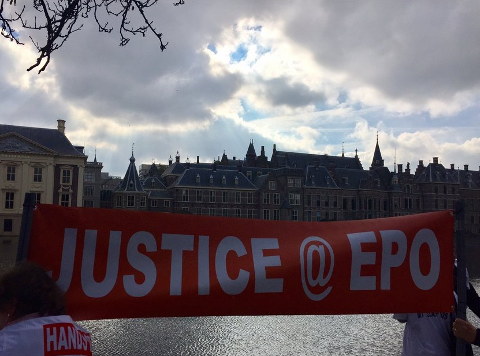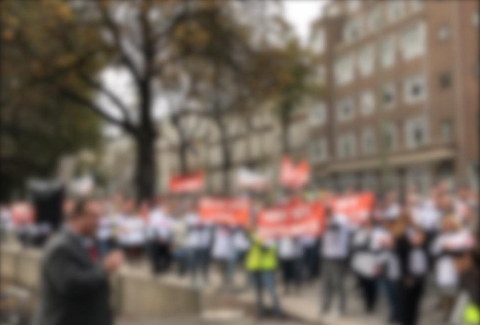

THE EPO, in its usual fashion, held a meeting mostly behind closed doors (media, for instance, is not allowed). We previously noted that Jesper Kongstad, Chairman of the Administrative Council (AC), openly boasted his liking for secrecy (even in bodies that should boast transparency and access, not 'trade' secrets and obscurity).
"The EPO is officially a scary place to work in, with as many as three staff representatives at The Hague now under attack from Battistelli and his goons."Tonight's series (it is very late here and I'm on coffee) will focus on information that became available to us -- courtesy of many different sources -- regarding the Administrative Council's meeting today and yesterday. The second day of the AC meeting at the EPO is now over and also both protests (the second protest took place today in The Hague). We have photos from The Hague and we decided to blur faces in respect for anonymity and defense from retribution. The EPO is officially a scary place to work in, with as many as three staff representatives at The Hague now under attack from Battistelli and his goons.

"Give another award to Elizabeth Holmes. It would be compatible with the EPO's values."Incredible lies from the EPO have meanwhile been disseminated in its Web site [warning: epo.org link]. The title is "EPO Social Conference: Discussing the way forward for the Office" and it says: "The studies and the feedback obtained from the conference will now be discussed with the different stakeholders in various EPO fora, starting with the Administrative Council in its October session, currently underway."
These are not "studies"; these are utter lies, or paid-for propaganda intended to bolster an agenda. We wrote about these before. "The 1st Social Conference in EPO’s history attended by 350 staff members & thousands watching online," the EPO wrote in Twitter. It did not say that it was denying access of those whom the so-called 'studies' are about, e.g. SUEPO. Excuse the staff while they take a moment to puke...
In the next few parts we are going to remark on the content and outcome of the AC meeting. Before we get to that, however, we would like to send a message to all EPO staff.
"Nobody benefits from it; the examiners hate it, the applicants don't get a good service, and the public will pay for it through the nose."With EPO management rushing to just grant crappy patents as fast as possible they will have run out of patent applications within a couple of years. What happens then? Just filing/registration? Will patent responsibilities fall under EUIPO (EU), which is inherently different? Some people speculate about it. Remember that rushed patent examination leads to errors. Wrong grants would cost Europeans plenty of money and wrong rejections would cost real inventors plenty of money and frustration. That's injustice. Nobody benefits from it except perhaps patent law firms, which benefit financially irrespective of the outcome (good or bad, or both in turn).
Today's EPO has become a sham. Even EPO insiders recognise this and they are trying to fix or salvage what's left of their employer. People with a Ph.D. in a particular field of science joined the EPO to examine/assess/review, not just rubberstamp old documents. Depression sets in when they feel as though they work in a production line with unattainable/unrealistic quotas. Nobody benefits from it; the examiners hate it, the applicants don't get a good service, and the public will pay for it through the nose.
"The venue, The Hague, has a special importance to it."EPO workers should work towards stopping Battistelli; he is doing enormous damage not only to the Office but also to the whole of Europe, to science, and to the European Union (unity). He has already stigmatised Europe or European institutions as snobby, aggressive, dismissive of the law, incapable of delivering justice, and apathetic to democracy, law and order, privacy, and a plethora of other things. It's not about the EPO anymore; it's not about labour rights either; it's not about international institutions; there is a lot more at stake, including the desirable unification of Europe and the advancement of science and technology. Eponia, as a victim of circumstances, became a major battleground over the future in the epicentre of Europe (the echelons or the likes of the UN). The venue, The Hague, has a special importance to it. ⬆